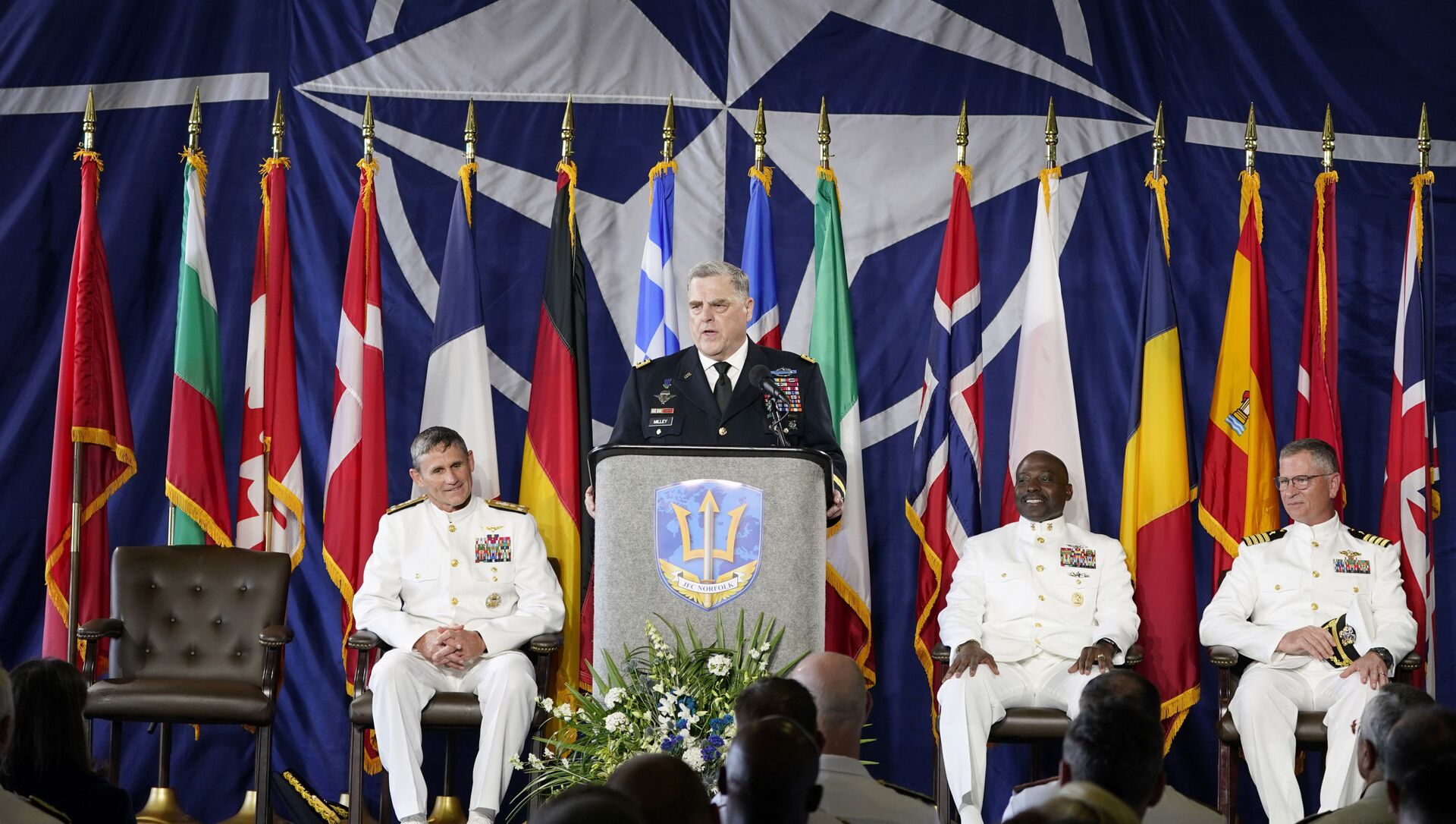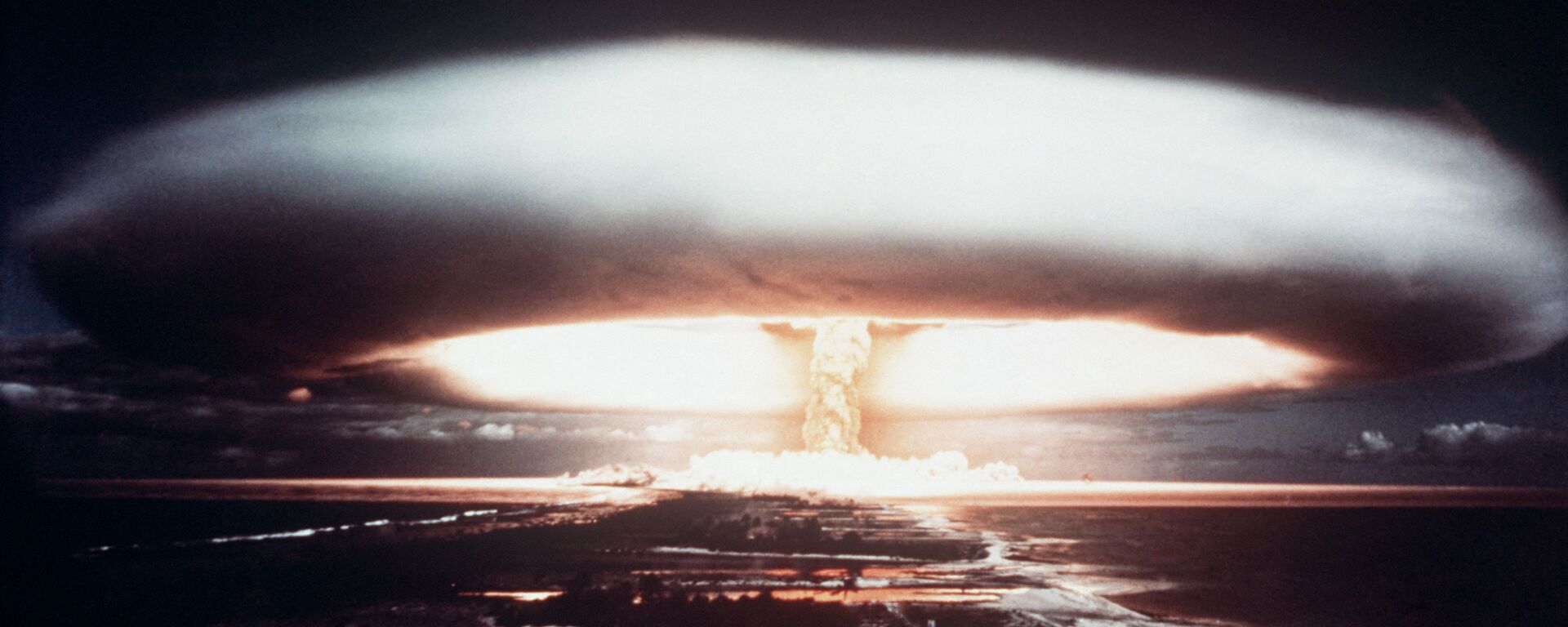https://sputnikglobe.com/20210718/pentagons-top-general-warns-of-great-power-war-as-nato-launches-new-anti-russia-atlantic-command-1083408766.html
Pentagon’s Top General Warns of ‘Great Power War’ as NATO Launches New Anti-Russia Atlantic Command
Pentagon’s Top General Warns of ‘Great Power War’ as NATO Launches New Anti-Russia Atlantic Command
Sputnik International
Biden's administration has continued his predecessors’ strategy of pushing Russia and China closer together via a hostile US sanctions policy and military... 18.07.2021, Sputnik International
2021-07-18T13:24+0000
2021-07-18T13:24+0000
2021-07-18T13:31+0000
military & intelligence
newsfeed
https://cdn1.img.sputnikglobe.com/img/07e5/07/12/1083408737_0:238:3072:1976_1920x0_80_0_0_6f62cec6c33dccf5dd7cff90d0baadd2.jpg
Joint Chiefs of Staff Chairman Gen. Mark Milley has warned of the dangers of a new global conflagration between the great powers while touting the Western alliance’s ability to stop such a scenario from becoming a reality.Speaking at the inauguration of the new NATO Joint Force Command Norfolk, a joint operational command tasked with tackling a ‘Resurgent Russia’ in the Atlantic, on Thursday, Milley warned that JFC-NF’s mission in the event of war would be to “fight the Battle of the Atlantic.”“I would tell you that the survival of NATO, the success or failure in combat in a future war in Europe, would largely depend on the success or failure of this command,” the general suggested, in a throwback to Cold War-style rhetoric.Recalling World War II, “the bloodiest war in human history,” and the First World War which preceded it, Milley estimated that some 150 million people around the world were killed in or as a result of the two conflicts.Detailing US casualties on the Western Front in WWII, Milley suggested that these losses were “the butcher’s bill of great power war,” and said that “that’s what this international order that’s been in existence for seven and a half decades is designed to prevent. That’s what JFC Norfolk is all about, is to prevent that outcome.”The “international order” Milley referred to is likely an allusion to the conferences held between 1944-1945 by the leaders of the Allied nations, which led to the creation of the United Nations and the formation of a postwar order aimed at preventing a great war from ever happening again.Senior Russian officials, including President Vladimir Putin and Foreign Minister Sergei Lavrov, have also spoken repeatedly of the post-WWII international order, but have recently accused the US and its allies of attempting to destroy the post-war order by questioning Moscow’s role in victory, and by expanding NATO up to Russia’s post-1991 borders.In his remarks Thursday, Milley suggested that NATO must continue to adapt to changes in the “character of war,” including “the organisations we fight with [and] the technology we use,” and to maintain military superiority against potential adversaries, to prevent the generation 10-15 years from being “condemned” to “what happened 76 years ago.”In his own comments at Thursday’s ceremony, Vice Adm. Andrew Lewis, the commander of the US 2nd Fleet now assigned to command JFC-NF as well, warned of increased Russian submarine activity in the Atlantic and the Arctic as a challenge to the West following its post-Cold War ‘victory’.The commander also clarified that the new NATO Atlantic command would ‘provide situational awareness’ and assist in alliance strategic planning, and take part in various alliance drills.
https://sputnikglobe.com/20210709/pentagon-report-warns-of-looming-danger-of-nuclear-war-as-major-powers-others-expand-arsenals-1083350796.html
Sputnik International
feedback@sputniknews.com
+74956456601
MIA „Rosiya Segodnya“
2021
News
en_EN
Sputnik International
feedback@sputniknews.com
+74956456601
MIA „Rosiya Segodnya“
Sputnik International
feedback@sputniknews.com
+74956456601
MIA „Rosiya Segodnya“
military & intelligence, newsfeed
military & intelligence, newsfeed
Pentagon’s Top General Warns of ‘Great Power War’ as NATO Launches New Anti-Russia Atlantic Command
13:24 GMT 18.07.2021 (Updated: 13:31 GMT 18.07.2021) Biden's administration has continued his predecessors’ strategy of pushing Russia and China closer together via a hostile US sanctions policy and military manoeuvres near the two countries’ borders.
Joint Chiefs of Staff Chairman Gen. Mark Milley has warned of the dangers of a new global conflagration between the great powers while touting the Western alliance’s ability to stop such a scenario from becoming a reality.
Speaking at the inauguration of the new NATO Joint Force Command Norfolk, a joint operational command tasked with tackling a ‘Resurgent Russia’ in the Atlantic, on Thursday, Milley
warned that JFC-NF’s mission in the event of war would be to “fight the Battle of the Atlantic.”
“I would tell you that the survival of NATO, the success or failure in combat in a future war in Europe, would largely depend on the success or failure of this command,” the general suggested, in a throwback to Cold War-style rhetoric.
“In my view, the world is entering a period of potential instability, as some nations – not all, but some – and clearly terrorist groups and perhaps some rogue actors are seeking to undermine and challenge the existing international order. And they seek to weaken the system of cooperation and collective security that has been in existence for some time,” Milley added, without mentioning which “nations” specifically he was referring to.
Recalling World War II, “the bloodiest war in human history,” and the First World War which preceded it, Milley estimated that some 150 million people around the world were killed in or as a result of the two conflicts.
Detailing US casualties on the Western Front in WWII, Milley suggested that these losses were “the butcher’s bill of great power war,” and said that “that’s what this international order that’s been in existence for seven and a half decades is designed to prevent. That’s what JFC Norfolk is all about, is to prevent that outcome.”
The “international order” Milley referred to is likely an allusion to the conferences held between 1944-1945 by the leaders of the Allied nations, which led to the creation of the United Nations and the formation of a postwar order aimed at preventing a great war from ever happening again.
Senior Russian officials, including President Vladimir Putin and Foreign Minister Sergei Lavrov, have also
spoken repeatedly of the post-WWII international order, but have recently
accused the US and its allies of attempting to destroy the post-war order by questioning Moscow’s role in victory, and by expanding NATO up to Russia’s post-1991 borders.
In his remarks Thursday, Milley suggested that NATO must continue to adapt to changes in the “character of war,” including “the organisations we fight with [and] the technology we use,” and to maintain military superiority against potential adversaries, to prevent the generation 10-15 years from being “condemned” to “what happened 76 years ago.”
In his own comments at Thursday’s ceremony, Vice Adm. Andrew Lewis, the commander of the US 2nd Fleet now assigned to command JFC-NF as well, warned of increased Russian submarine activity in the Atlantic and the Arctic as a challenge to the West following its post-Cold War ‘victory’.
“We are again being challenged by threats in these waters. [Russia and China] both have increased their presence in the Atlantic, from the Arctic Circle to the South Pole,” Lewis said. In such a situation, he lamented, NATO “can no longer assume we have control over the Atlantic, as we had at the end of the Cold War.”
The commander also clarified that the new NATO Atlantic command would ‘provide situational awareness’ and assist in alliance strategic planning, and take part in various alliance drills.




